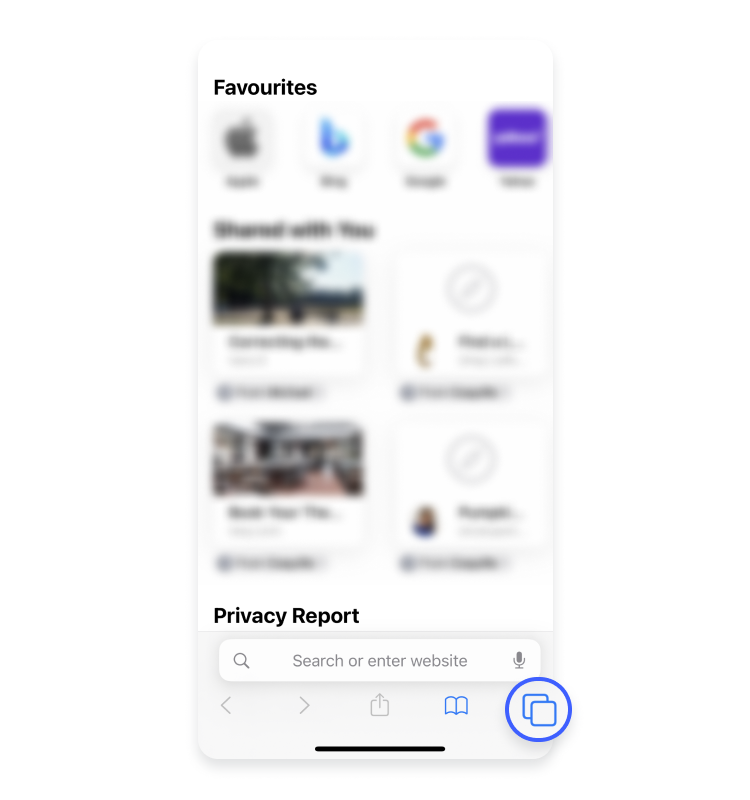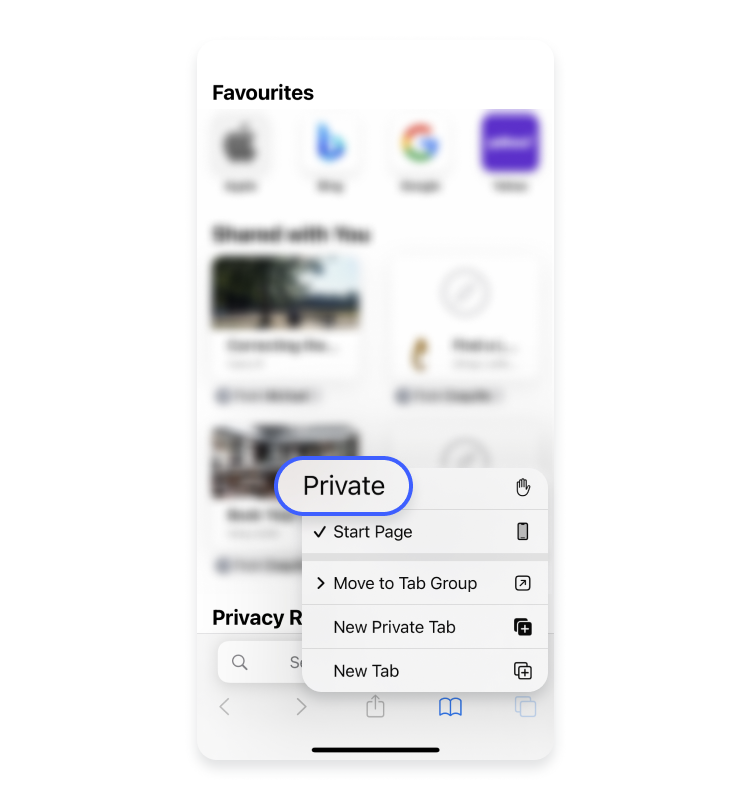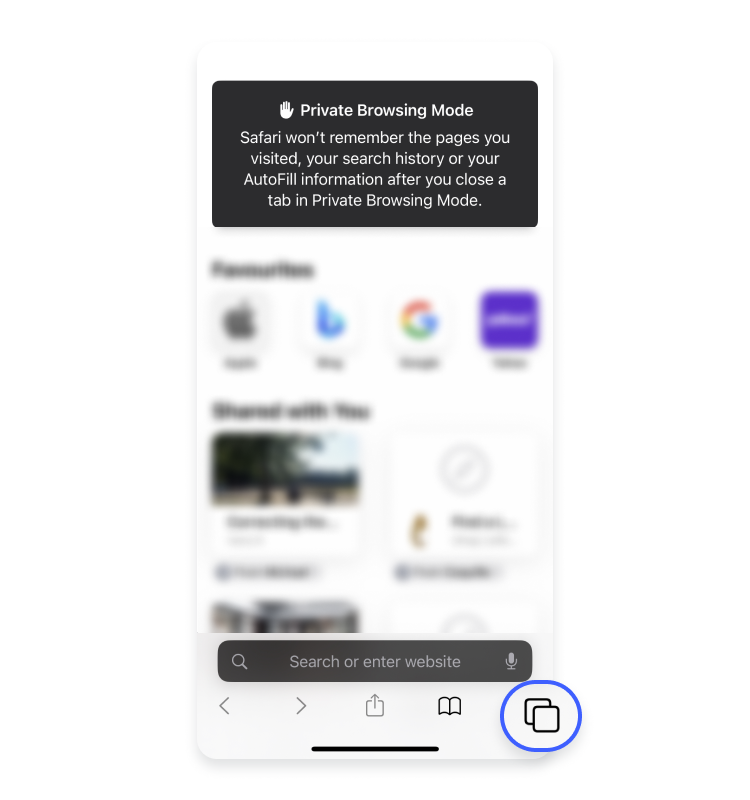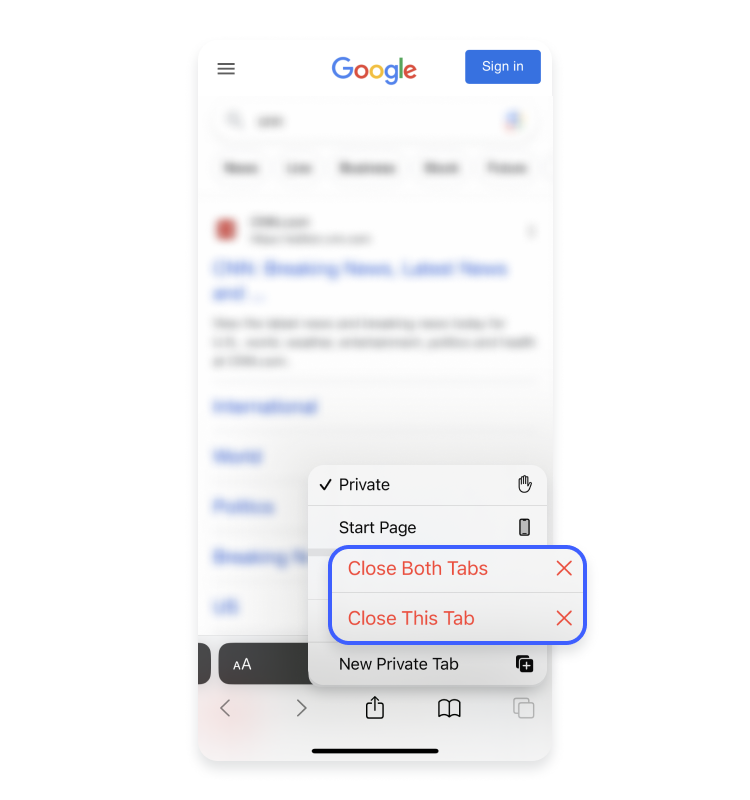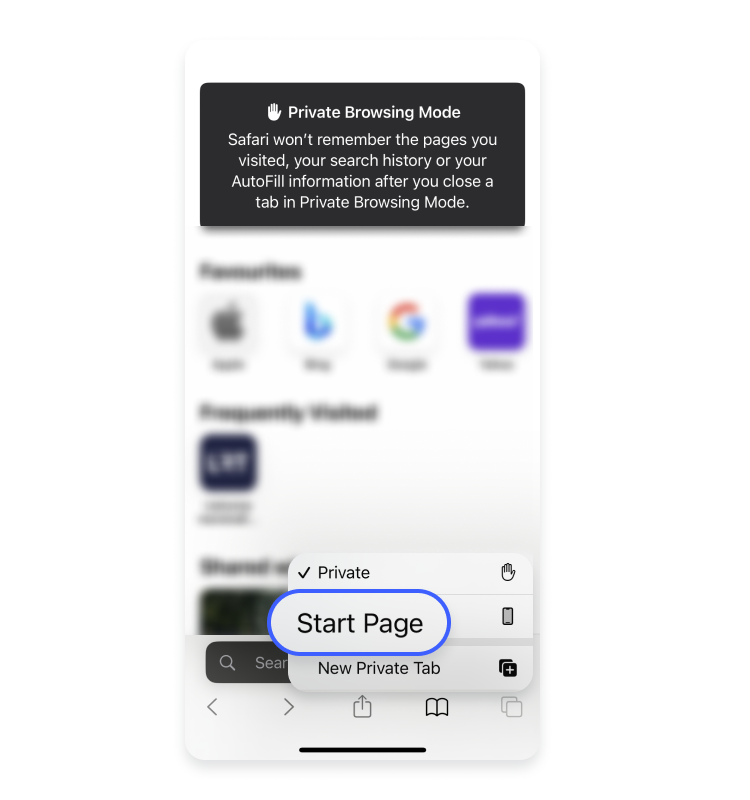Can private browsing be traced on the iPhone?
Private browsing is a helpful tool to hide your search history on many devices, including your iPhone. But have you ever wondered how much privacy the private window actually grants you? Let’s find out how effective Safari’s incognito mode is and how to enhance it.
Contents
What is private browsing?
Private browsing is a function that allows you to roam the internet without the browser storing information about your searches or activities online. A private browser doesn’t store cookies, login details, or search prompts beyond the browsing session — when you close the private window, all your browsing data is deleted.
This feature is native to most web browsers, including iPhone’s Safari. When in use, private mode helps you receive search results less affected by your previous searches or your user profile. It helps to hide your browsing history and clear cookies on the iPhone effortlessly.
How to turn on private browsing mode
Follow these steps to enable private browsing mode on Safari:
- Open Safari on your iPhone and long tap the tabs button — an overlapping squares icon — at the bottom right corner of the screen.

- Tap the “Private” option from the menu.

How to turn off private browsing mode
When you decide to close your private browsing session, proceed with the following:
- Long tap the tabs button while you’re on a private window.

- Click the “Close this tab” or “Close all tabs” option, depending on how many private windows you have open and want to close.

- Long tap the tabs button once again and click “Start page.” If you had any tabs open before you switched to private mode, you should choose the “Tabs” option — next to it, you’ll see the number of tabs already opened in the regular browser mode.

Is private browsing really private?
Private browsing provides only a thin layer of privacy because it mainly concerns your device, preventing it from storing your browsing and login details and collecting cookies. The information from a private session also doesn’t appear on any other Apple devices tied to your account. However, entities like your internet service provider (ISP), network administrator, and the websites you visit can trace your online activity even when you’re in a private browsing session. Let’s look closer at how your online activities can be observed even when you’re trying to browse privately.
How private browsing can be traced on iPhone
Your activities in Safari’s private web browser can be traced in various ways, depending on which entity is trying to track you online. Here is a list of parties and their most common ways to track you while you’re in a private browser on an iPhone:
- ISP. Whenever you attempt to visit a website, your computer sends a request to the website’s server, asking to connect. This request always goes through your ISP first — after all, ISP is the entity that provides you with the internet connection. This means all your online traffic flows through your ISP, which can potentially log information about your online activities.
- Network administrator. Similarly to an ISP, whenever you want to access a website, your device sends a request to reach it through the network you’re using. Because the network administrator controls your network, it can examine your internet traffic. In the context of home networks, their administrator is usually the ISP itself.
- Websites. Every online device has its internet protocol (IP) address that websites use as a return address to send you the website data or, in other words, to let you open the website. You simply couldn’t access the web without an IP address. On their end, websites can memorize your IP address and use browser fingerprinting techniques to identify your device type, its operating system, and the browser you use.
- Malware. If you had bad luck with malware infecting your iPhone, note that it can easily log your browsing activity even if you try to keep it private.
- Active accounts. Last but not least, if you log in to your social media accounts while browsing in private mode, it is as if you’re not using this feature at all — everything you post will be tied to your user account.
How to check private browsing history on iPhone
It’s not possible to check your iPhone’s private browsing history because the primary purpose of private browsing is to prevent the device from storing any search history, cookies, or other browsing-related information. Once you close the private browsing session, all your search data is deleted from your iPhone without the possibility of recovering it.
If you need to keep a record of your browsing history, the best way to do that is by using regular browsing mode. You can make it more private by manually deleting the accumulated browsing history and cookies.
Avoiding tracking in private browsing: 4 tips
As shown, private browsing can hide your online history almost exclusively from yourself and your iPhone. However, you can still deter unwelcome parties from peeping at your online activity. Here are four tips on strengthening your privacy online while using the private browsing feature.
Use a virtual private network (VPN) with private browsing
A VPN is a tool that encrypts your data and routes it via a designated VPN server before it reaches the internet, this way hiding your IP. This means that your ISP and network provider can only see which VPN server you are connected to, while the websites you visit can only spot the IP address of that VPN server. A VPN creates an additional layer of privacy, and when used in private browsing mode, it can help to hide your online activity from various entities connected to you by the network.
However, choosing a VPN for your iPhone from a reliable provider is crucially important. Many free VPN services that are easily accessible online may sell your data to third-party services, defeating the purpose of a more private and safer presence online.
Use a privacy-focused search engine
Privacy-focused search engines are designed to provide search results without profiling users based on their searches. As a result, they don’t track or store user data and their browser history. One such example is the search engine DuckDuckGo. It doesn’t use trackers to serve you personalized ads as more commonly used search engines, such as Google and Yahoo, do. When possible, DuckDuckGo connects you to the encrypted versions of web pages, making it more difficult for third parties to snoop on your browsing activity.
However, if you’re using a privacy-focused search engine in your regular browser, make sure to clear the cache on your iPhone regularly. Regardless of which search engine you use, your browser may still be storing temporary data, which may include your sensitive information, in the form of the cache and cookies of your searches.
Consider using a privacy-focused search engine combined with private browsing mode as it will help keep your search history clear from both your iPhone and the web.
Avoid signing in to accounts
If you’re signing into your accounts or social media profiles during private browsing sessions, it’s as if you don’t use the privacy feature at all. No matter which browser you’re using, as soon as you log in to your accounts, your activity on the platform is instantly linked to your identity.
However, incognito mode is a great feature you can use when you need to log in to your account using a device that doesn’t belong to you. Once you end your private session, the browser removes all cookies, including login credentials, and leaves no trace of you having logged in on that particular device and its browser.
If you need to create an account to access a website during your private browsing session, Apple offers a workaround — a feature called an auto-generated email address. It generates a unique, random email address you can use for the website but forwards emails to your actual email address. The website never sees your real email address but only the Apple-generated one.
Regularly update your browser
Browser updates (regardless of what you use — a regular or a private browser) are developed to fix known browser vulnerabilities, add new security features, or enhance the existing ones. Regularly updating your browser can help improve your privacy and security online because it enables you to use the latest tracker-blocking tools, more robust encryption, and advanced controls for managing cookies.
Want to read more like this?
Get the latest news and tips from NordVPN.
